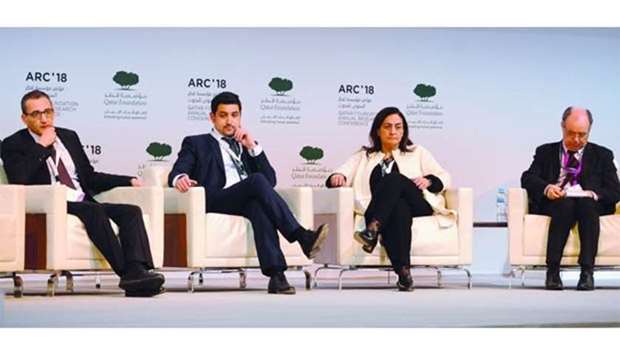The Qatar National Research Strategy (QNRS) was analysed in detail at a number of workshops and the participants presented the progress made by the research entities to meet the challenges of the country on the concluding day of the Annual Research Conference 2018 ( ARC’18) on Tuesday.
Discussions were centred around the four QNRS pillars: Energy and Environment; Computing and Information Technology; Health and Biomedical; and Social Sciences, Arts and Humanities. The participants highlighted their initiatives for accelerating the impact of research and innovation in areas of the highest priority and relevance to Qatar’s industry, economy, and society.
The seventh edition of ARC ’18 was held over two days at Qatar National Convention Centre under the theme ‘R&D: Focusing On Priorities, Delivering Impact’, with thousands of local and international delegates participating in expert-led sessions on research, innovation, technology, and their role in building a sustainable, diversified, and globally-competitive economy.
The second day of the conference started with a plenary session, titled ‘Delivering Impactful Science, Technology, and Innovation Strategy.’ The keynote presentations provided multinational perspectives on how research strategies can bring the greatest benefit to society, engage stakeholders, overcome challenges, and pave the way for impact.
Speakers at the discussion were Prof Mariam al-Ali al-Maadeed, vice president, Research and Graduate Studies, Qatar University; Prof Low Teck Seng, CEO, National Research Foundation, Singapore; Dr Orkun Hasekioglu, vice president, Scientific and Technological Research Council of Turkey; and Datuk Dr Mohamed Yusoff Sulaiman, president and CEO, Malaysian Industry-Government Group for High Technology. The session moderated by Dr Frans Van Den Boom, executive director, Policy, Planning and Evaluation, Qatar Foundation Research and Development (QF R&D).
“In research and innovation, we can no longer work alone,” said Datuk Dr. Sulaiman. “We cannot process all the knowledge and technology that is available alone – we must work with relevant partners, and there must be agreement between the public and private sectors on how to move forward.”
Dr Hasekioglu said: “There are certain pillars that allow a research and innovation ecosystem to develop – leadership and strategy-planning; attracting international talent, which does not necessarily mean they have to be physically based in the country; and having the right environment to nurture ideas and innovation.”
In the closing plenary session of ARC’18, topics explored and discussed in the workshops were summarised and channelled into preliminary recommendations for the next steps in updating the QNRS.
The intensive parallel sessions held under the ARC’18 Research Strategy Track and across these sessions enabled participants from across Qatar’s R&D landscape, and international delegates, to share their views and insights and to understand and learn from each other, capitalising on the platform for knowledge exchange that ARC’18 provides to make the process of updating the QNRS a truly collaborative one.
The seventh edition of ARC ’18 was held over two days at Qatar National Convention Centre under the theme ‘R&D: Focusing On Priorities, Delivering Impact’, with thousands of local and international delegates participating in expert-led sessions on research, innovation, technology, and their role in building a sustainable, diversified, and globally-competitive economy.
The second day of the conference started with a plenary session, titled ‘Delivering Impactful Science, Technology, and Innovation Strategy.’ The keynote presentations provided multinational perspectives on how research strategies can bring the greatest benefit to society, engage stakeholders, overcome challenges, and pave the way for impact.
Speakers at the discussion were Prof Mariam al-Ali al-Maadeed, vice president, Research and Graduate Studies, Qatar University; Prof Low Teck Seng, CEO, National Research Foundation, Singapore; Dr Orkun Hasekioglu, vice president, Scientific and Technological Research Council of Turkey; and Datuk Dr Mohamed Yusoff Sulaiman, president and CEO, Malaysian Industry-Government Group for High Technology. The session moderated by Dr Frans Van Den Boom, executive director, Policy, Planning and Evaluation, Qatar Foundation Research and Development (QF R&D).
“In research and innovation, we can no longer work alone,” said Datuk Dr. Sulaiman. “We cannot process all the knowledge and technology that is available alone – we must work with relevant partners, and there must be agreement between the public and private sectors on how to move forward.”
Dr Hasekioglu said: “There are certain pillars that allow a research and innovation ecosystem to develop – leadership and strategy-planning; attracting international talent, which does not necessarily mean they have to be physically based in the country; and having the right environment to nurture ideas and innovation.”
In the closing plenary session of ARC’18, topics explored and discussed in the workshops were summarised and channelled into preliminary recommendations for the next steps in updating the QNRS.
The intensive parallel sessions held under the ARC’18 Research Strategy Track and across these sessions enabled participants from across Qatar’s R&D landscape, and international delegates, to share their views and insights and to understand and learn from each other, capitalising on the platform for knowledge exchange that ARC’18 provides to make the process of updating the QNRS a truly collaborative one.


